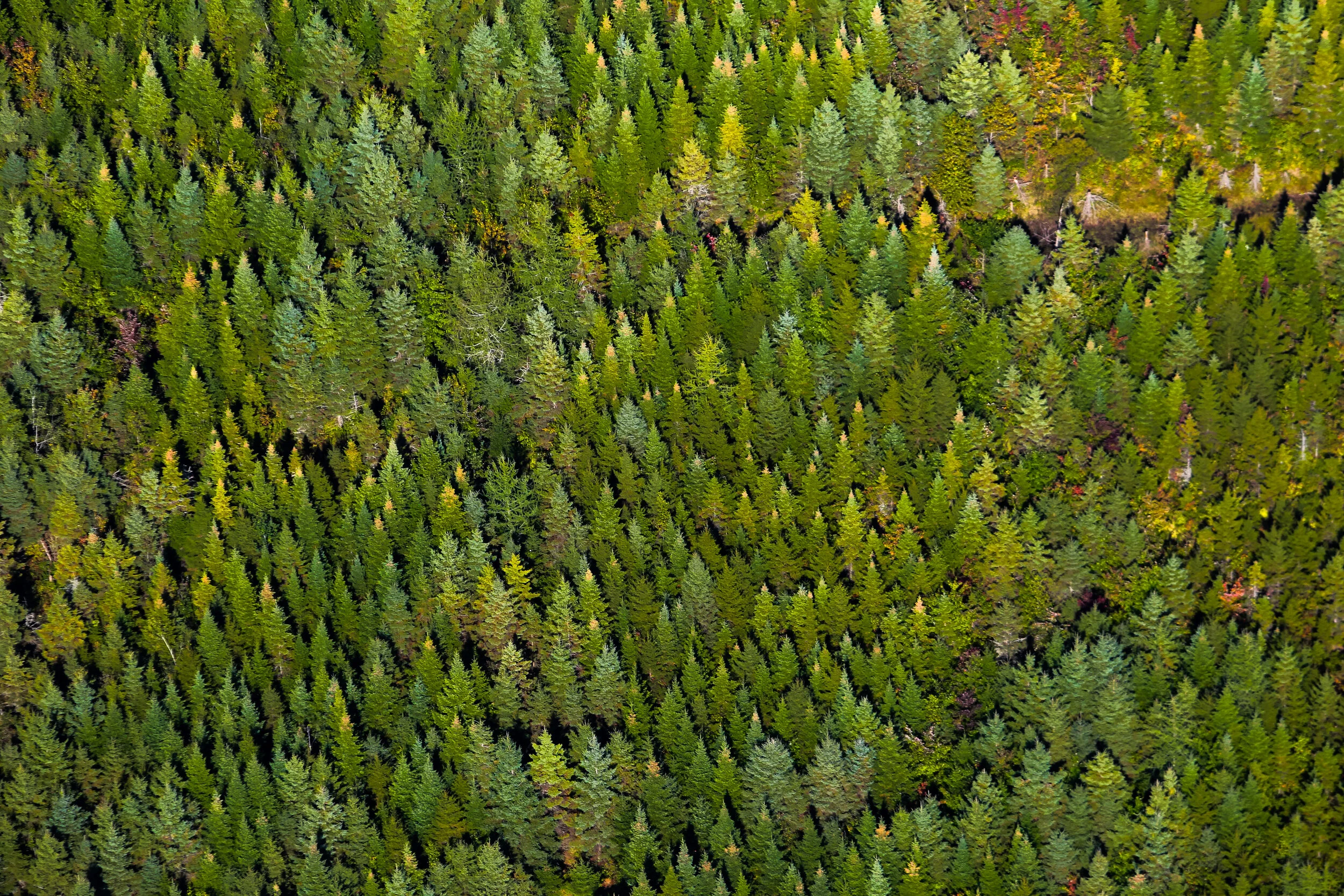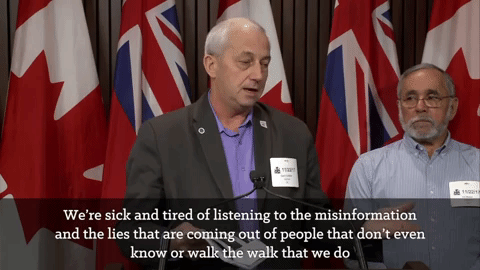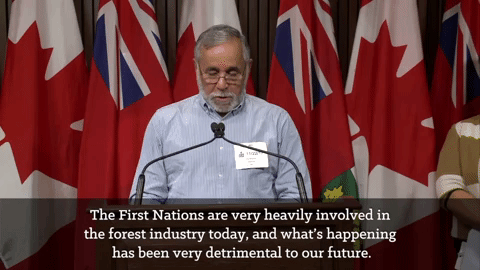Resolute’s Letters to NRDC Concerning Their Latest Misinformation
For years, Natural Resources Defense Council (NRDC) has engaged in a long-running pattern of misinformation about Canadian forestry practices. Their leadership and staff have ignored many of the First Nations, mayors, unions, and other representatives of boreal communities who expressed concerns that the group’s misleading campaigns were “denigrating the work of sustainable forestry in Canada, and causing grave harm to local economies, communities and the people who live and work in the boreal.” They have similarly ignored concerns from associations representing the vast majority of forestry employers in Quebec and Ontario.
Responding to Newsweek’s Misleading Opinion Piece
Statement on Developments in U.S. Litigation
You Won’t Believe Greenpeace’s Latest Hypocrisy in Canadian Case
In a recent filing in our case against them in Canada, Greenpeace’s lawyers have made another astonishing and hypocritical assertion – namely, that Resolute’s attempts on this blog to inform the public about Greenpeace’s failure to comply with a court order is somehow “disparaging” to their organization.[1]
Our public statements about their use of legal maneuvering and delay tactics are entirely accurate. The deadline set by the court passed, more than 10 weeks ago. Resolute delivered its affidavit of documents disclosing more than 20,000 documents; Greenpeace continues to defy the court order and has not produced an affidavit of documents, although they’ve had more than 2 years to do so. Yet it is “disparaging” for us to point out these facts and question the reasons why?
Let’s not forget that for years, Greenpeace has “disparaged” Resolute, calling our company “Forest Destroyers” among other false and misleading claims. In reality, our company has been internationally recognized for our stellar environmental record.[2] Among other things, we have planted over a billion trees in the boreal forest, significantly cut our carbon footprint, invested in renewable energy, and have improved the forest’s ability to absorb greenhouse gases using methods recognized and encouraged by the U.N. Intergovernmental Panel on Climate Change.
In one report that has been cited repeatedly throughout their campaign, Greenpeace doctored photos to falsely assert that Resolute had developed roads and was harvesting in restricted areas.[3] Despite retracting and admitting their statements were false, Greenpeace continued to make inaccurate and deceptive allegations months later.
Greenpeace’s claims about our company are not just disparaging, they are false and defamatory.
Further, we pointed out to the court that defiance of the law is a common practice for Greenpeace, specifically referring to comments made by Greenpeace Canada Director Joanna Kerr. In an interview, Kerr told the Journal Pioneer newspaper she “would knowingly break the law as a ‘tactical or strategic’ move to draw attention to a cause.”[4] In this latest filing, Greenpeace lawyers claimed her remarks were “about civil disobedience in general” and that “Greenpeace respects both the court and its processes.” So by their own account, Greenpeace will break the law when it pleases but not in this instance? Does that seem trustworthy?
But we know that Greenpeace has a long track record of disregarding both legal and cultural boundaries. Greenpeace is reported to have hired “vandals” to destroy farmers’ crops in Thailand;[5] sentenced for breaking into a nuclear power plant in France and setting off fireworks to simulate a “malicious attack”;[6] were accused of “burglary, vandalism, trespassing and inducing panic” in Cincinnati;[7] were cited by the government of India for “financial fraud and falsification of data”;[8] were labeled part of a “growing security threat” by national law enforcement in Canada; inflicted long-term harms on the Inuit economy with their campaigns;[9] and were charged and fined by the Peruvian government after admitting to irreparably damaging the historic Nazca lines.[10]
The public deserves to know the full truth about Greenpeace’s misconduct. In fact, we have a moral obligation to continue doing so in an effort to set the record straight and defend our integrity. And, as we’ve pointed out time and again, Greenpeace has continued to thwart their court-ordered obligations, raising serious questions about what exactly they are afraid will be revealed.
_
References:
[1] http://www.resolutevgreenpeace.com/blog/2017/12/1/greenpeace-fails-to-produce-documents-in-canadian-case
[2] http://blog.resolutefp.com/category/recognition/
[3] http://www.huffingtonpost.ca/2013/03/20/greenpeace-canada-resolute-retraction_n_2917122.html
[4] https://www.pressreader.com/canada/journal-pioneer/20140614/281784217163230
[5] http://www.slate.com/articles/health_and_science/science/2015/07/are_gmos_safe_yes_the_case_against_them_is_full_of_fraud_lies_and_errors.html
[6] https://www.reuters.com/article/us-france-nuclearpower-greenpeace/french-greenpeace-activists-convicted-over-nuclear-plant-intrusion-idUSKCN1GC1XK
[7] http://www.wlwt.com/news/9-Greenpeace-protesters-arrested-after-banners-hung-from-P-G-towers/24797378
[8] https://www.reuters.com/article/us-india-greenpeace/india-orders-greenpeace-to-shut-down-over-fraud-idUSKCN0SV1OP20151106#rX2zZhXM07Ay5cqt.97
[9] https://www.theguardian.com/world/2017/may/11/sealskin-trade-inuit-fashion-designers-greenpeace
[10] https://www.usatoday.com/story/news/world/2018/02/01/truck-drives-over-peru-nazca-lines/1086119001/
Greenpeace Fails To Produce Documents in Canadian Case
As part of our ongoing litigation against Greenpeace in Canada, the court rightly ordered both parties to make documentary disclosure by December 15. During this process, both parties are required to exchange documents relevant to the litigation. Resolute delivered its affidavit of documents disclosing more than 20,000 documents. Greenpeace has failed to comply with the court order and has not made any documentary disclosure.
For several years, Greenpeace has used legal maneuvering to delay court deadlines and avoid the discovery process. Now, they are simply evading court deadlines altogether. As we’ve seen time and again, Greenpeace continuously fails to take responsibility for their harmful actions. This time, Greenpeace is defying their court-ordered responsibility to produce documents that are vital to this case.
Greenpeace’s countless motions, procedural delays and outright failure to comply with the Court’s order to make documentary disclosure raise serious questions about their credibility and legitimacy. What exactly is Greenpeace attempting to hide?
Greenpeace’s failure to respond to the courts in this case is symptomatic of its general unwillingness to respond to anyone who demands answers or accountability from them. For years, Greenpeace has shown indifference to boreal communities, who have voiced their concerns about the damages caused by their anti-forestry campaigns. First Nations, unions, and leaders of boreal communities have all reached out to Greenpeace only to be ignored.
At a recent press conference, frustrated representatives from communities across northern Ontario – including First Nations, mayors and unions – called for an end to activist distortions about Canada’s forestry practices. Boreal communities depend on forestry and recognize that the forest provides a sustainable and renewable resource. Community leaders also understand that decisions about forest management policies in the boreal forest should be determined based on sound science as well as the potential impacts on the hardworking people who live and work in the boreal. They should not be based on the irresponsible and unsustainable demands of misinformed activists like Greenpeace whose proposals threaten the future of these communities.
Leaders such as Wendy Landry, Mayor of Shuniah and member of the Red Rock Indian Band, recognize that activists like Greenpeace and their cohorts rely on misinformation to support their claims:
Mayor of Kenora Dave Canfield has worked in the forest sector and expressed his frustration with being told by anti-forestry groups what’s best for his community:
Forestry is an essential sector in Ontario and in the wider Canadian economy, as Unifor Research Director Bill Murnighan pointed out:
While anti-forestry activists seek to fill their coffers and fundraise based on misinformation campaigns, the livelihoods of those that live and work in the boreal hang in the balance. Mayor of Kapuskasing Alan Spacek recognizes this threat:
Forestry is also one of the largest employers of First Nation communities in Canada. As Chief Ed Wawia of the Red Rock Indian Band explained, First Nations are concerned about the impact of activist misinformation on their communities:
But anti-forestry activists like Greenpeace continue to disregard the concerns of boreal communities in an effort to promote their own agendas. When these communities reach out to Greenpeace and their allies, they are ignored.
Those who live and work in the boreal forest are most intimately acquainted with the reality on the ground. They know that Canada’s boreal forest is far from endangered, and they want policies based on sound science rather than fear. Most of all, they want to ensure that the boreal continues to thrive and sustain their communities for generations to come.
7 Canadian Forestry Facts That May Surprise You
Greenpeace and their cohorts continue to spread false and misleading information about Canada’s forest management practices. Their campaigns call on forest products companies like ours to halt operations, threatening thousands of jobs and livelihoods in the process, or seek further regulations from the Canadian government.
But these groups’ claims about Canadian forestry practices are full of hot air.
Here are 7 facts about Canadian forests that they omit from their campaigns.
1. Canada’s forestry laws are strict – and they are enforced. One recent report, funded with the support of the Forest Stewardship Council®, concluded:[1]
2. Canada’s deforestation rate is very low – less than 0.01% each year – and that rate is actually falling! According to Natural Resources Canada, deforestation in Canada is generally the result of land conversion for agriculture (43%), resource extraction (34%) or urban expansion (12%).[2]
3. Less than 0.5% of Canada’s forests are harvested each year – that’s about the half the size of Connecticut, but spread out over all of Canada. It’s also far less than the amount disturbed by insects, disease and forest fires combined.[3]
4. Canadian law requires that 100% of harvested areas be regenerated. In Quebec and Ontario, the provinces in which Resolute operates, about 75-80% regenerates naturally. The other 25% is promptly reforested.
5. Canada is a leader in forest certification with 37% of all the world’s certified forests. 48% of Canada’s forests are certified by third parties, ensuring compliance with recognized standards of sustainable forest management.[4]
6. Canada’s boreal forest is a source for people’s livelihood through direct employment – in harvesting and regenerating forests, and in manufacturing operations – and indirect employment – the grocery stores, schools, hospitals and thousands of other businesses and organizations that depend upon boreal communities.
7. The Canadian forest products industry is crucial for Aboriginal communities. 17,000 Aboriginal people are employed directly or indirectly or make their living from the forest products industry, making it one of the largest employers of Aboriginal people in the country.[5]
_
[1] http://www.resolutevgreenpeace.com/blog/2017/9/13/new-report-confirms-canadas-strong-forest-management-practices
[2] http://cfs.nrcan.gc.ca/publications?id=38871
[3] http://cfs.nrcan.gc.ca/publications?id=38871
[4] http://cfs.nrcan.gc.ca/publications?id=38871
[5] http://www.nrcan.gc.ca/forests/canada/aboriginal/13173
Responding to InsideClimate’s Slanted Coverage
In August, we became aware that an article about our case was forthcoming in the environmental advocacy publication InsideClimate News. Since Nicholas Kusnetz, the InsideClimate reporter writing the story, had not reached out to us, we wrote to him proactively. We pointed out that the outlet has close financial ties with Greenpeace and its allies, and asked him in good faith how his publication could possibly engage in objective reporting on this matter when its top editor and publisher, David Sassoon, has been a paid consultant with Greenpeace, a fact reported in a variety of publications.
Here’s part of what we wrote:
First, is it true that your boss and publisher, David Sassoon, has been a paid consultant on policy and public relations to Greenpeace? How much was he paid by Greenpeace and is he still operating his professional consulting firm for environmental NGOs?
Also, a review of your reportage shows an extensive list of articles casting various activist campaigns in a highly favorable light, particularly when they are aiming at natural resources companies. The same could be said of InsideClimate as a whole. In light of that tilted perspective, how can we be assured that your reporting on Resolute will be objective and even handed?
A number of outlets have also raised questions about the objectivity of InsideClimate’s reporting, given the fact that they share a number of donors with activist groups like Greenpeace. On the funding page of their website, InsideClimate lists Greenpeace donors Ford Foundation, Grantham Foundation, Park Foundation, and Rockefeller Brother’s Fund. The Ford Foundation has even publicly repeated Greenpeace’s flawed talking points regarding companies that attempt to stand up to attacks from environmental activists.
Kusnetz offered no substantive response to our inquiry regarding its obvious conflict of interest. Yet the resulting article, full of skewed and selective sourcing and notable omissions, speaks for itself on that score.
Kusnetz writes, for instance, that “[t]here's some disagreement on whether Resolute's logging practices stand out from its peers—many environmentalists say they do, but some people familiar with its work dismiss the claim.” That is the sum total of time and detail Kusnetz lends to scrutinizing Greenpeace’s misleading allegations. Some say X, others Y. Readers aren’t offered evidence for the competing claims — for instance that Resolute has been multiply awarded as a global leader in sustainability — or even told who is making them so they can assess their relative credibility.
Yet elsewhere Kusnetz gives corporate consultant Michael Marx many words to criticize Resolute, while noting only that Marx “works with several of the named groups” in the lawsuit. Kusnetz won’t tell us which groups, or disclose the nature of Marx’s financial relationship with them, but lets him claim Resolute’s suit is aimed at “taking away” Greenpeace’s ability to employ its strong-arm tactics, which Marx says have become “the real driver in the social responsibility movement.”
Among the acts of “social responsibility” Marx credits to Greenpeace are its “work against genetically modified crops” and a “campaign on sustainable fishing.” What both he and Kusnetz leave out are that the fishing methods favored for years by Greenpeace have recently been found by independent researchers at the University of California, Merced, to have a far worse carbon footprint than the methods they want outlawed, meaning companies who took their advice could have ended up making the environment worse, not better. Even more glaringly, Greenpeace’s destructive attacks on golden rice, and the indigenous farmers who grow it to feed malnourished populations, have been decried in a public letter by 100+ Nobel Laureates as contributing to “blindness and death in children in the developing world.” One Nobel winning physiologist told The Washington Post that Greenpeace’s campaign is “damaging and is anti-science,” a “way to scare people” and “raise money for their cause.” Kusnetz euphemizes all of this as Greenpeace’s “work against genetically modified crops.”
In our own case, Kusnetz’s piece ignores a similar outcry from First Nations leaders and thousands of citizens in both Quebec and Ontario, the Canadian jurisdictions in which Resolute operates, who have expressed concern and condemnation of Greenpeace’s misinformation campaign. Leading trade unions representing workers in the boreal region have also repeatedly denounced the economic damage and threats to jobs caused by Greenpeace’s misleading attacks and unwillingness to engage with their communities. We made Kusnetz aware of this, but he chose to ignore it.
Kusnetz also quotes numerous sources to support Greenpeace’s flawed defense that our use of racketeering laws to hold their actions accountable is an attack on free speech, but fails to mention Greenpeace’s hypocrisy on the issue, which we’ve highlighted repeatedly. As Bloomberg Businessweek reporter Paul Barrett pointed out, when Greenpeace supports RICO actions against other companies, it takes “a narrower view of protected expression.”
The distorted, one-sided view of the case and its merits on offer from InsideClimate News, and the basic failure to disclose, let alone justify, their financial conflict of interest with Greenpeace, speak volumes about the organization and its priorities. Readers would be right to view this piece from InsideClimate News with the utmost skepticism and scrutiny.














